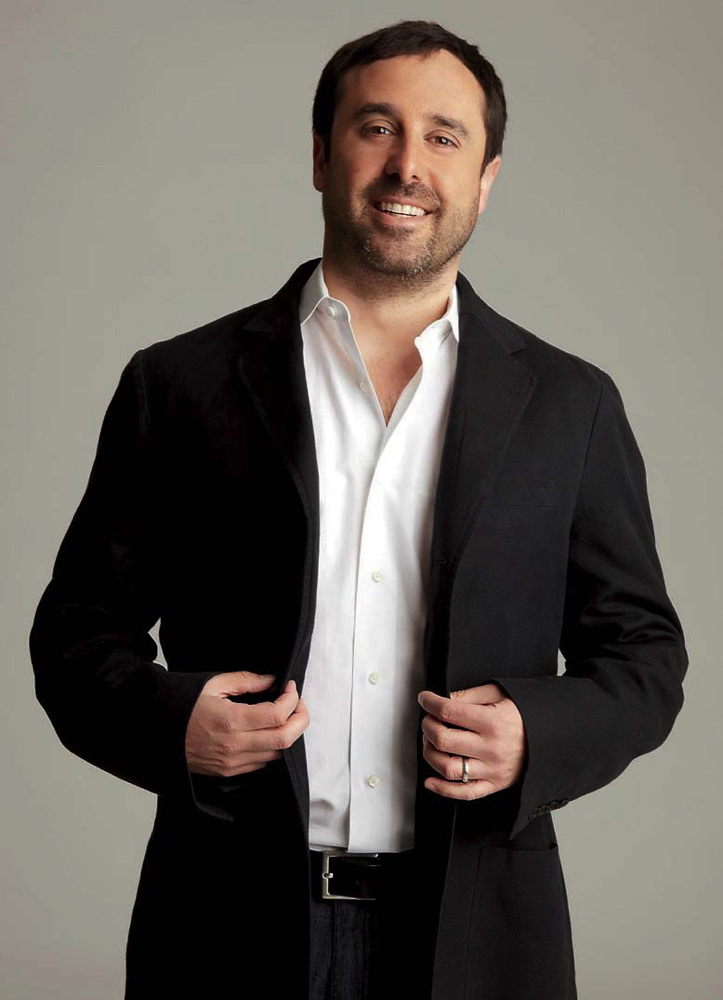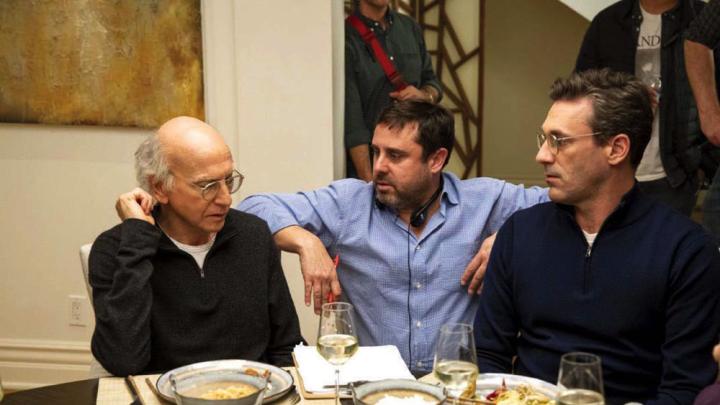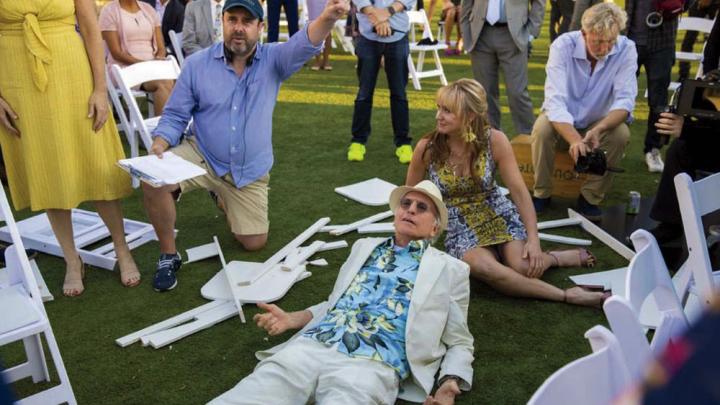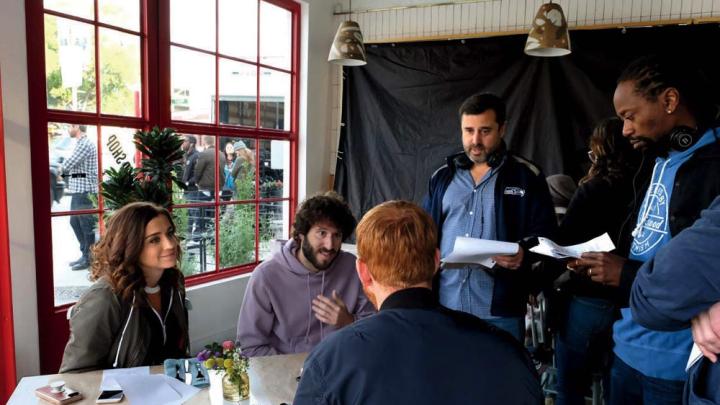Remember that Seinfeld episode where Kramer was collecting skeletons and refurbishing them to museum quality by washing the bones in Jerry’s dishwasher so he could sell them off?
No? Maybe that’s because it never happened. Television writer, director, and producer Jeff Schaffer ’91 and his friends Alec Berg ’91 and David Mandel ’92 were writing for the show in 1995 when they took that idea to head writer and co-creator Larry David. He rejected it. Two years later, Schaffer and Berg were actually running the show as executive producers and revisited the concept. “We said, ‘Eh, Larry was right,’” recalls Schaffer.
Seinfeld transformed Schaffer’s career, as it did for those of Berg and Mandel, and not just because he came up with the concept of the Festivus pole and he and Berg helped write the episode that added “re-gifting” to the English language. It’s because of what he learned from David behind the scenes as he climbed from writer to executive producer. “We got to follow him around and just pester him and he taught us everything from blocking to editing to sound mixing,” says Schaffer, who later became an executive producer on David’s next show, Curb Your Enthusiasm, in which David plays a fictionalized version of himself, living in semi-retirement after the success of Seinfeld.
The crucial lesson was about where to find the humor. “The bedrock foundation for comedy is finding interesting stories and then figuring out what vessel they fit into,” he says. The skeleton idea was funny but always felt shoehorned in. “A story should be funny when you tell it—[Seinfeld’s] George gets caught eating out of the trash—but it also should be funny in how it intersects with the other stories. So you keep collecting stories, even if sometimes you’ll have stories you’ve saved for years and years.”
Schaffer picked up another valuable comedy tip in college from a less likely source than David. He came to Harvard hoping to join The Lampoon, though he hadn’t realized that comedy writing was a legitimate career. He had a “wandering curriculum”: he was briefly pre-med, was a classics concentrator, and studied Mayan civilization before graduating with a degree in biological anthropology.

Jeff Schaffer
Photograph courtesy of John P. Johnson/HBO
By then, however, he, Berg, and Mandel were writing a fake Lampoon documentary timed to coincide with MTV’s tenth anniversary. (That televised parody of anniversary specials was picked up by Comedy Central, a crucial early résumé item.) So when Irven DeVore, Moore professor of biological anthropology and then-chair of the department, asked what his plans were, Schaffer said, “Comedy writer.” DeVore, a social anthropologist, offered a piece of advice drawn from his own field: “Comedy is all about social taboos.”
“I took that with me and everything I’ve done has been about breaking taboos,” Schaffer says. When something embarrassing happens to him, he always thinks about ways to use it for laughs on TV. “When people ask, ‘Do you know where the line is?’”—the line he shouldn’t cross—“I say, ‘Of course, I can look back and see it.’ Sometimes actors say, ‘We can’t do that,’ and I say, ‘We can and then we’re going to do this, too.’”
When Schaffer first met with Dave Burd, better known as the rapper and comedian Lil Dicky, to discuss possibly collaborating on what this spring became the sitcom Dave, Burd revealed personal details about his disfigured genitals. “He said, ‘It’s a secret, no girlfriend even knows,’” Schaffer recalls. “So I said, ‘Actually, that’s going to be in the first scene of the show.’ And it was.”
Schaffer’s television comedy success—he and his wife, Jackie Schaffer, also created The League, about Chicagoans in a football fantasy league, and ran it for seven seasons—is about more than collecting stories and pushing people’s buttons. His penchant for talking too much and too fast actually makes him effective at what he calls “puzzle solving,” pushing ahead till he finds the best option.
Mandel agrees. When something doesn’t work, he explains, many comedy writers—including himself—“stare into the abyss, even though silence is deadly. Jeff will machine-gun you with jokes. Not all work, of course, but many do and he keeps the conversation moving.”
Burd, a TV novice before Dave, adds that Schaffer is “a master of structure and understanding script flow,” but “even more valuable on set, quarterbacking everything that happens—he’s not the director, but he’s so hands-on and good with the actors, never getting flustered.” An admitted “high-maintenance” star and co-creator, Burd also marvels at Schaffer’s commitment. “He was working on our show and on Curb and he has a family but I’ll send him emails, sometimes complaint-based, at 11 p.m. and he responds by 11:06. How does he do that?”
Schaffer’s own shows share stylistic similarities with the hits he’s worked on with Larry David, yet he has also navigated the differences. Seinfeld was a highly structured, tightly scripted series, while Curb shoots with nothing but a story outline a few pages long. “Each scene is semi-improvised with live rewrites,” Schaffer says. “It sounds real because people are actually listening to each other.” During filming, David doesn’t want to know what the other actors are going to say and wants to be surprised. Meanwhile Schaffer, as executive producer, is often creating jokes and conflict on the spot: “I’m whispering in the other actors’ ears, ‘Maybe you can say this.’ So the show is made like Larry’s life is lived—the entire world is against him.” Curb also allows room for what Schaffer calls “magical digressions,” in which David and, say, co-star J.B. Smoove happen to talk about something random on set and decide to work that into the show. “It can still be solid comedy,” Schaffer explains, “because we’ve worked so hard on the structure,” the underlying narrative framework.
Dave, like The League before it, falls in between the Seinfeld and Curb approaches. “We cast good improvisers,” he says, “but the show is more scripted for each scene, although we encourage everyone to say things their own way, so they’re talking like people really talk.” That makes the humor feel more spontaneous and organic.
Schaffer isn’t sure if he has always been adaptable or if he developed these skills during his career. Nor, to be honest, does he fully understand how he became one of TV’s top comedy producers. “I’ve never done a lot of introspection,” he admits. “It’s all about playing. In college we’d talk about strange and stupid things to make each other laugh. Now I just do that professionally—all the things I used to get in trouble for, I now get paid handsomely for. And I get to wear what most people would wear to wash their car.”










